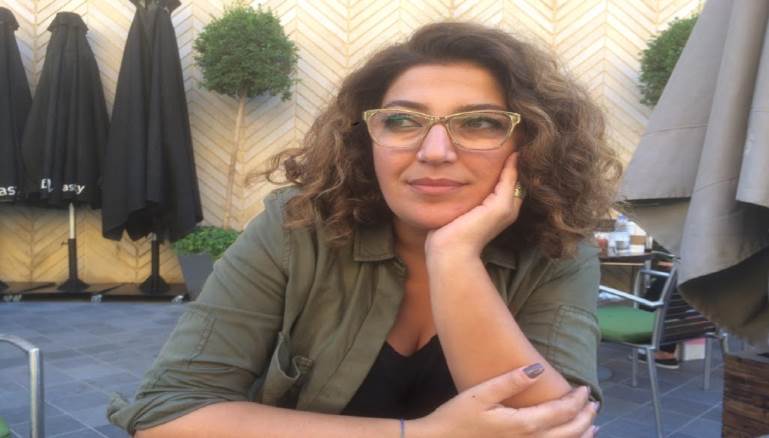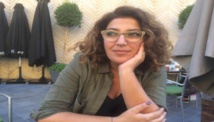For 10 years AFAC has supported various genres of art - including film-making, performance and literature - by giving annual grants for 140 cultural projects run by individuals or organizations. The Beirut-based organization works with Arab artists in the region and in exile.
Rima Mismar, a Lebanese executive director and film critic who has led the organization since January 2017 following years of being a cinema programme manager and deputy director, recently spoke to dpa in Berlin.
dpa: What is the festival about?
Mismar: The festival is a part of the Arab European Creative Platform, a three-year programme that was launched in October 2016. Taking into consideration the new circumstances of immigration, the programme aims to fulfil the urgent needs of Arab artists who were forced to flee from their homelands or to be exiled, especially Syrians. Those artists live in a different new reality where they need support.
dpa: Was there any particular reason behind choosing Germany?
Mismar: We chose Germany as a pilot stage of our programme due to the high numbers of newcomers who have been welcomed in the country. It was much easier to find cultural partners and Arab artists here. We were always keen on German partnership while organizing our cultural activities. In July, we cooperated with the Heinrich Boell Foundation to organize a writing in exile forum in Germany. For this [film] festival, our partner is ALFILM, the Arab Film Festival Berlin, which has been the largest one in Germany since 2009.
dpa: Why do we need such an independent cultural organization in Arab countries?
Mismar: There was a severe shortage in the funding of the cultural sector in the region, when a group of cultural actors, businessmen, and philanthropists launched the organization in 2007. On the other hand, the public cultural sector, financed by the state, is restricted to certain agendas. Therefore, some artists are excluded, especially the ones who work on projects opposed to the mainstream culture.
dpa: Which role should culture play in the communities of recently established newcomers in Europe?
Mismar: As a cultural organization we have a strong belief in the role of cultural production in a transitional phase. We realized the new aspects of this phase; the political and economic consequence of the influx of immigration as well as the debate over it, which ranges from welcoming to racism. As a result, the [Arab European Creative] Platform came to strengthen exiled artists' cultural projects in Europe. For example, the musical opening of the festival is a cooperation project between Arab and European musicians.
dpa: How did you select the 10-film programme?
Mismar: The programme consists of films which have been financially supported by AFAC during the last 10 years. It reflects a variety of visual art and geographical background. We aim to showcase the richness of cultural production in Arab countries such as Tunisia, Yemen, Lebanon, Egypt and Palestine. All the films have English subtitles and two of them come with German subtitles.
dpa: One film touches on a taboo-topic in the Arab world: the sexual identity of a gay man in a Lebanese family. Which criteria do you set to support a project?
Mismar: In general, we support projects that are less likely to be supported in Arab countries. In terms of content, we aim to support projects addressing bold and provocative issues. If the art is harmless, it will have no impact on society. On the other hand, the project must have artistic value, not only have a provocative topic.
dpa: How does the Arab market receive such projects?
Mismar: Arab audiences still do not have accessibility to watching such films in theatres. However, such a vital battle should be continued over screening these films.
dpa: Has independent cinema flourished in the wake of the Arab uprisings?
Mismar: For sure, the Arab independent cinema landscape has reached a peak. Despite of the current political reality, the Arab revolutions erased many barriers. In comparison to 15 years ago, the question of screening independent movies become vital due to growing production. Therefore, we have launched a mobilized independent film festival in Beirut, Cairo and Tunisia since 2014. The AFAC movie week makes prize-winning movies available to audiences.
dpa: What about film censorship?
Mismar: With the increasing radical voices, the cultural sphere becomes more challenging. However, the rising voices of independent film-makers is a good indication for change.
dpa: The opening film of the festival is directed by a female Tunisian film-maker. What is the presence of Arab women film-makers in independent cinema?
Mismar: It is noticeable that the number of female Arab documentary film-makers has grown faster in the wake of the revolutions. Thus, the festival programme reflects such an increase.
--------------------------------------------------------------------------------------------------------------
Rima Mismar, a Lebanese executive director and film critic who has led the organization since January 2017 following years of being a cinema programme manager and deputy director, recently spoke to dpa in Berlin.
dpa: What is the festival about?
Mismar: The festival is a part of the Arab European Creative Platform, a three-year programme that was launched in October 2016. Taking into consideration the new circumstances of immigration, the programme aims to fulfil the urgent needs of Arab artists who were forced to flee from their homelands or to be exiled, especially Syrians. Those artists live in a different new reality where they need support.
dpa: Was there any particular reason behind choosing Germany?
Mismar: We chose Germany as a pilot stage of our programme due to the high numbers of newcomers who have been welcomed in the country. It was much easier to find cultural partners and Arab artists here. We were always keen on German partnership while organizing our cultural activities. In July, we cooperated with the Heinrich Boell Foundation to organize a writing in exile forum in Germany. For this [film] festival, our partner is ALFILM, the Arab Film Festival Berlin, which has been the largest one in Germany since 2009.
dpa: Why do we need such an independent cultural organization in Arab countries?
Mismar: There was a severe shortage in the funding of the cultural sector in the region, when a group of cultural actors, businessmen, and philanthropists launched the organization in 2007. On the other hand, the public cultural sector, financed by the state, is restricted to certain agendas. Therefore, some artists are excluded, especially the ones who work on projects opposed to the mainstream culture.
dpa: Which role should culture play in the communities of recently established newcomers in Europe?
Mismar: As a cultural organization we have a strong belief in the role of cultural production in a transitional phase. We realized the new aspects of this phase; the political and economic consequence of the influx of immigration as well as the debate over it, which ranges from welcoming to racism. As a result, the [Arab European Creative] Platform came to strengthen exiled artists' cultural projects in Europe. For example, the musical opening of the festival is a cooperation project between Arab and European musicians.
dpa: How did you select the 10-film programme?
Mismar: The programme consists of films which have been financially supported by AFAC during the last 10 years. It reflects a variety of visual art and geographical background. We aim to showcase the richness of cultural production in Arab countries such as Tunisia, Yemen, Lebanon, Egypt and Palestine. All the films have English subtitles and two of them come with German subtitles.
dpa: One film touches on a taboo-topic in the Arab world: the sexual identity of a gay man in a Lebanese family. Which criteria do you set to support a project?
Mismar: In general, we support projects that are less likely to be supported in Arab countries. In terms of content, we aim to support projects addressing bold and provocative issues. If the art is harmless, it will have no impact on society. On the other hand, the project must have artistic value, not only have a provocative topic.
dpa: How does the Arab market receive such projects?
Mismar: Arab audiences still do not have accessibility to watching such films in theatres. However, such a vital battle should be continued over screening these films.
dpa: Has independent cinema flourished in the wake of the Arab uprisings?
Mismar: For sure, the Arab independent cinema landscape has reached a peak. Despite of the current political reality, the Arab revolutions erased many barriers. In comparison to 15 years ago, the question of screening independent movies become vital due to growing production. Therefore, we have launched a mobilized independent film festival in Beirut, Cairo and Tunisia since 2014. The AFAC movie week makes prize-winning movies available to audiences.
dpa: What about film censorship?
Mismar: With the increasing radical voices, the cultural sphere becomes more challenging. However, the rising voices of independent film-makers is a good indication for change.
dpa: The opening film of the festival is directed by a female Tunisian film-maker. What is the presence of Arab women film-makers in independent cinema?
Mismar: It is noticeable that the number of female Arab documentary film-makers has grown faster in the wake of the revolutions. Thus, the festival programme reflects such an increase.
--------------------------------------------------------------------------------------------------------------









 Home
Home Politics
Politics











